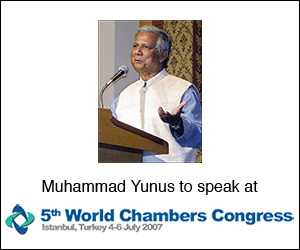In the October issue of the MicroCapital Monitor, we reported that “we may look back on September 2006 as the catalyst month for microfinance.” From the microcapital perspective, the Peace Prize awarded to Mr. Yunus will take us from catalytic moment to a flood of capital more quickly than most anticipated.
Are we ready? On this day of great celebration, we urge caution.
Mr. Yunus has traveled the world tirelessly to promote “credit as a human right”, inspiring audiences and global leaders alike with his unflappable charisma and compelling message. To see him is to believe him; to understand his message is to be called to action. The Nobel committee aptly states that he “has shown himself to be a leader who has managed to translate visions into practical action for the benefit of millions of people [because] lasting peace can not be achieved unless large population groups find ways in which to break out of poverty.” For over 30 years, microfinance entrepreneurs like Mr. Yunus have overcome all naysayers to prove the practice: Micro-credit works.
However, for years now, business-minded microfinance luminaries committed to eradicating global poverty in our lifetimes have cautioned us that “microfinance lacks capacity”. This is to say that micro-banks currently lack the institutional strength to become large (“scaled”) organizations due to unprofessional management, opaque governance, and meager balance sheets. Poverty continues to dwarf micro-banks. In short, micro-banks as a class are still immature.
Mr. Yunus’ micro-bank, of course, does not lack capacity. Since 1983, when the Grameen bank was founded, it has lent the equivalent of USD 5.72 billion to some 6 billion Bangladeshis in 70,000 villages. It has a gross loan portfolio (as of December 2005) of USD 424 million on a total asset base of USD 646.5 million, upon which it returned 0.32%.
Such powerful micro-banks are the exception to the rule. Of the estimated 10,000 micro-banks operating around the world (no one knows the actual number), almost all are small “mom and pop” outfits unprepared to handle the coming flood of capital. Around 100 have the capacity of the Grameen Bank. However, this cautionary reality will be lost, lost when millions of people today flock to the wires to learn about microfinance after Mr. Yunus’ long-overdue recognition.
Broad and deep institutional capacity is required to deliver credit as a human right. Until recently, donors have bank-rolled this development. Indeed, Grameen is a success story propelled by millions of dollars in donations and subsidies. However, those days are over. Now that microfinance has turned the corner, such donations and subsidies wreck progress by distorting competition and retarding the institutional capacity of emerging micro-banks. The job of being a responsible donor in microfinance has become very complicated.
Accordingly, microfinance investors also face huge challenges to success. Now that the flood gates have opened, we will soon start to see melt-downs of microfinance sectors in specific countries due to over-investment, be it investments for a return on capital, or subsidies, or donations which continue to flow contrary to established best-practices.
The flood of interest by the Peace Prize will require investors to seek innovation like never before. Examples of buy-side products to watch include: TIAA-CREF’s equity investment, Citigroup’s fund committed to “second-tier” or emerging micro-banks, or Gray Ghosts’ secondary market activity. Donors too are innovating (often led by CGAP); examples of donor innovation include Kiva’s peer to peer lending or the Grameen Foundation’s guarantee fund.
In conclusion, Mr. Yunus, thank you so very much for your leadership. The microfinance watershed is upon us thanks to great leaders like you and everyone who has labored for so long to prove that micro-credit works. The next stage, the stage when we provide responsible financial services to the global majority at a good price, will depend on world-class risk management.

 Professor Muhammad Yunus, the winner of the 2006 Nobel Price, is expected to attend and deliver a speech at the 5th World Chambers Congress (WCC) in Istanbul, between July 4 and July 6.
Professor Muhammad Yunus, the winner of the 2006 Nobel Price, is expected to attend and deliver a speech at the 5th World Chambers Congress (WCC) in Istanbul, between July 4 and July 6. Oxus Kyrgyzstan, one of three microfinance institution (MFI) affiliates of the France-based Oxus Development Network, recently borrowed local currency approximately equivalent to USD 1.6 million from Grameen Credit Agricole (GCA) Foundation, which has offices in France and Luxembourg. Like its partner MFIs in Afghanistan and Kyrgyzstan, Oxus Kyrgyzstan seeks to
Oxus Kyrgyzstan, one of three microfinance institution (MFI) affiliates of the France-based Oxus Development Network, recently borrowed local currency approximately equivalent to USD 1.6 million from Grameen Credit Agricole (GCA) Foundation, which has offices in France and Luxembourg. Like its partner MFIs in Afghanistan and Kyrgyzstan, Oxus Kyrgyzstan seeks to